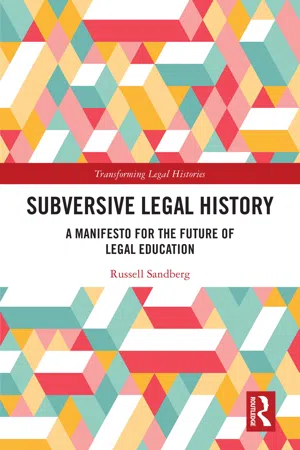
- 280 pages
- English
- ePUB (mobile friendly)
- Available on iOS & Android
About This Book
Provocative, audacious and challenging, this book rejuvenates not only the historical study of law but also the role of Law Schools by asking which stories we tell and which stories we forget.
It argues that a historical approach to law should be at the beating heart of the Law School curriculum. Far from being archaic, elitist and dull, historical perspectives on law are and should be subversive. Comparison with the past underscores: how the law and legal institutions are not fixed but are constructed; that every line drawn in the law and everything the law holds as sacred is actually arbitrary; and how the environment into which law students are socialised is a historical construct. A subversive approach is needed to highlight, question, de-construct and re-construct the authored nature of the law, revealing that legal change on a larger scale is possible. Far from being archaic, this recasts legal history as being anarchic.
Subversive Legal History is not a type of Legal History but is its defining characteristic if it is to be a central part of Law School life. It describes a legal method that should not be the preserve only of specialist legal historians but rather should be part of the toolkit of all law students, teachers and researchers.
This book will be essential reading for all who work and study in Law Schools, proposing a radical new approach not only to the historical study of law but also to the content, purpose and ambition of legal education. A subversive approach can revolutionise Law Schools providing a more ambitious legal education which is grounded in the socio-legal reality, helping to ensure that today's law students are better equipped to be the professionals and citizens of tomorrow.
Frequently asked questions
1 The Trouble with Law Schools
The prime task of the jurist is to take the cases and statutes which provide the raw material of the law on any particular topic and by a critical re-appraisal of that raw material, to build up a systematic statement of the law on the relevant topic in a coherent form, often combined with proposals of how the law can be beneficially developed in the future.3
doctrinal study explicitly identifies questions outside the doctrinal range as being something not relevant for the doctrinal student. It implicitly devalues such questions and treats them as not being worthy of consideration within the precise, objective word of the law school.
Table of contents
- Cover
- Half Title
- Series Page
- Title Page
- Copyright Page
- Dedication
- Table of Contents
- 1 The Trouble with Law Schools
- 2 The Problem with Legal History
- 3 Subversive Legal History
- 4 The F in Feminist Legal History
- 5 The Perils of Periodisation
- 6 Counterfactual Legal History
- 7 The Parallel World of Legal Geography
- 8 We Are all Legal Historians Now
- Afterword
- Index